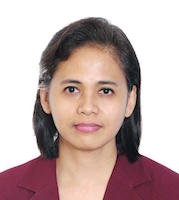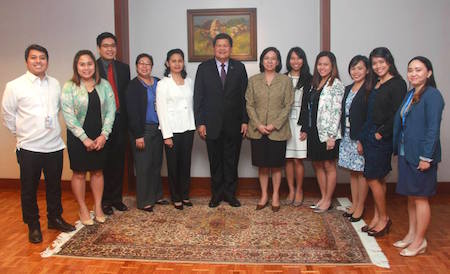 Judith A. Esteban-Sungsai
Judith A. Esteban-Sungsai
Senior Director, Central Point of Contact Department 1
Supervision and Examination Sector
Bangko Sentral ng Pilipinas (BSP)
Public Policy Program (’92)
Please tell us about your career path so far. What is your area of specialization and how did you come to work in this area?
Bank supervision is my area of specialization. I have been in this field since 1986 and my career blossomed in this area.
As a fresh graduate in college and a newly certified accountant, the usual entry point is to be employed by an audit firm. Thus, I gained employment in one of the top three audit firms in the Philippines to gain the audit experience. This audit experience has been the backbone of my career here at the Bangko Sentral ng Pilipinas (Central Bank of the Philippines) or the BSP. The BSP is one of the sought after employers in the government sector.
I started my career here at the BSP as junior bank supervisor handling commercial banks. And I worked my way up the hierarchy by equipping myself with the necessary experience including fellowship at the Bank for International Settlements in Switzerland, civil service eligibilities and education which I obtained at GRIPS, among others, to be at the targeted position. Adept as bank supervisor, I moved to policy development in 2014 to further enhance competencies. Here I gained international experience having represented the BSP in the Executives’ Meeting of East Asia Pacific Central Banks (EMEAP) – Working Group on Banking Supervision for about two years. The EMEAP is comprised of 11 central banks/supervisory authorities that discuss and share emerging supervisory risk issues and best practices on banking supervision. The BSP hosted in 2014 the 19th Governors meeting held in Cebu, Philippines.
I was further exposed to financial stability initiatives of the BSP closely collaborating with the securities regulator, the insurance regulator, and the deposit insurer on surveillance and policy reform matters.
At present, I am tasked to oversee banking stability through effective offsite supervision.
You have just been promoted to Senior Director Central Point of Contact Department I at Bangko Sentral ng Pilipinas. What are your main responsibilities and duties?

An audience of BSP GRIPS alumni with the newly appointed BSP Governor Nestor Espenilla Jr. – who is himself a proud GRIPS alumnus – in August 2017.
The Central Point of Contact Department I is in-charge of the offsite supervision of the largest and complex banks including the domestically systemically important banks. These financial institutions constitute about 50% of the total assets of the Philippine banking system. As Senior Director, I oversee the effective discharge of offsite supervision of supervised financial institutions, the supervisory activities of which range from identifying emerging risks in the system, licensing, and acting as the relationship officer of supervised institutions.
In your current capacity, what do you see as the main opportunities and challenges for the Philippines over the course of the next five to ten years?
In the next five to ten years following are both the opportunities and challenges for the Philippines:
- Philippines is in the demographic sweet spot. It is in the millennial age. It has a young population averaging 24 years old, hence, I see a lot of potential in terms of employment, consumption and talents.
- Supervision needs to catch up with the age of digitization and onset of cryptocurrency.
- The BSP and Philippine banks may need to prepare for the Asean Banking Integration Framework (ABIF). Best practices may be adopted.
What are some of the biggest challenges you face in your work? And what have been the most interesting or rewarding aspects of your career thus far?
Banking is very dynamic. The speed of change in banking technology, products and services is so fast. Development of banking regulations need to stay ahead of the curve to keep at pace with the changes. Regulators need to be more innovative and developmental. This is what is keeping my supervisory career interesting. Being able to contribute more in terms of effective supervision for purposes of banking stability is the most rewarding one.
What led you to GRIPS/GSPS? What is the most important thing you got out of your studies here, and how has your experience at GRIPS prepared you for future endeavours?
GRIPS offers a multi-disciplinary approach to policy decision-making. The policy science menu ranging from fiscal and monetary, industry and trade, labor, transportation and other policy areas prepared me to adopt the international best practices to policy decision-making. Learning these policy sciences and the Japanese policy-making process was the critical learning from GRIPS.
What are some of your fondest memories of your time spent at GRIPS? And what do you miss about Japan?
To be advised by well-known government officials or academicians like Prof. Naoyuki Yoshino, Prof. Naoyuki Shinohara and Prof. James Rhodes for the thesis completion is a learning and unforgettable experience.
Further, GRIPS is like a small world. The network of Asian participants sharing varied cultures gives a lot of perspective in dealing with various people. The GRIPS cultural social events and the school trips to Kyoto and Osaka temples and historical places further deepened my understanding of Japan. If I may say its a cultural immersion.
The discipline of Japanese people, the unique culture of Japan, speaking the Japanese language, the sight of cherry blossoms and the autumn leaves, the sight of the Emperor’s palace and the Golden Temple, the bargain hunts during bazaars, the apple orchard visitation, and of course, the safe bicycle rides to and fro GRIPS and train stations, are what I miss of Japan.
These experiences were the most memorable ones.
How do you maintain a balance between your work and the rest of your life? And what is your favorite thing to do when you are not working?
Maintaining balance between work and quality of life is very important for a more effective discharge of duties. Having “Me Time” refreshes my mind, body and soul from the stress arising from work. To de-stress, I usually stroll in the mall or go shopping with my husband Henry. I also watch a lot of television and do some week-ender sorties like vacays and eat-outs with family or friends.
If you could give one piece of advice to anyone considering studying at GRIPS what would it be?
If you are into policy development, GRIPS is the place to be as it offers a multi-disciplinary approach to policy-making. GRIPS grows and nurtures you as a leader.
How would you like to maintain involved with the School? What do you expect from GRIPS as an alumnus and do you have any suggestions on how to further utilize the GRIPS alumni network?
Involvement as an alumnus is preferred. The expectation is to carry on with the constant communication with alumnae for GRIPS updates as well as GRIPS events. The newsletter, the “Alumnus of the Month” and the directory update are to reckon with in optimizing the GRIPS network. To deepen the alumni network, perhaps a grand reunion of all graduates and professors of GRIPS be held.




